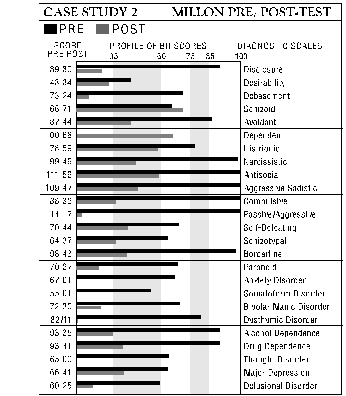Mcmi Iii Test Manual
Overview: Assessment of DSM-IV®-related personality disorders and clinical syndromes.: C Age Range: 18 and older Reading Level: 8th Grade Other Languages: Spanish Administration: Paper-and-pencil, computer, or online administration Completion Time: 25–30 minutes (175 true/false items) Scores/Interpretation: Adult inpatient and outpatient clinical sample; inmate correctional sample Scoring Options: Q-global™ web-based, Q Local™ Software, Mail-in Scoring, or Manual Scoring Report Options: Interpretive and Profile Reports Publication Date: 1994. Updated in 2009 with combined gender norms and a new Inconsistency (W) scale, the empirically validated, relevant, and reliable MCMI-III assessment provides support for the opinions of psychologists and other mental health professionals in clinical, counseling, medical, forensic, and other settings.
The Millon Clinical Multiaxial. That also expands on several advances introduced in the MCMI-III in recent years.This. MCMI-IV test manual. This edition of the MCMI represents a significant revision of the MCMI–III. These Test Booklets include the items and all necessary instructions for completing.
Users & Applications Engaging and accessible, the MCMI-III is ideal for use with individuals being evaluated for emotional, behavioral, or interpersonal difficulties. The instrument helps:.

Assess the interaction of Axis I and Axis II disorders based on the DSM-IV® classification system. Identify the deeper and pervasive personality characteristics underlying a patient's overt symptoms.
Gain an integrated understanding of the relationship between personality characteristics and clinical syndromes to facilitate treatment decisions Features & Benefits. Developed by Dr. The facet scales are designed to help clinicians interpret elevations on the Clinical Personality Patterns and the Severe Personality Pathology Scales. Reports Interpretive Report This report provides an integrated interpretation of the scales, including a description of the patient's personality characteristics and an assessment of clinical syndromes within the context of those characteristics. This report provides:. Patient's demographic information.
Graphic presentation of base rate scores for all scales. Listing of possible DSM-IV diagnoses. Treatment Guide - provides short-term treatment options based on individual results. Capsule Summary of results - helps clinicians readily put results to work Profile Report Providing a graphic representation of base rate scales for all scales, this report can help quickly identify clients who may require more intensive evaluation. Corrections Report Read about the.
Scoring and/or Reporting Options – Enables you to quickly assess and efficiently organize examinee information, generate scores, and produce accurate comprehensive reports all via the Web. Enables you to score assessments, report results, and store and export data on your computer.
Specially designed answer sheets are mailed to Pearson for processing within 24–48 hours of receipt; results returned via regular mail. The MCMI-III Webinar will be presented by Seth Grossman, Psy.D, and will cover the practical application of the instrument as well as some valuable updates, including clinical utility of the MCMI-III facet scales for treatment planning, information on the recently released combined gender norms and new Inconsistency (W) scale. Valued for its brevity, the MCMI-III instrument helps clinicians quickly and accurately assess DSM-IV®-related disorders and clinical syndromes. A hallmark of this proven assessment is its treatment-oriented Interpretive Report, which presents an integrated and personalized view of results.
Mcmi-iii Test Manual
The MCMI-III test should be used for diagnostic screening or clinical assessment of adults who evidence problematic emotional and interpersonal symptoms or who are undergoing professional psychotherapy or a psychodiagnostic evaluation. It should not be used with nonclinical cases. Individuals under the age of 18 should be administered the Millon Adolescent Clinical Inventory (MACI ® test) or the Millon Pre-Adolescent Clinical Inventory (M-PACI ®), depending on the individual’s age, rather than the MCMI-III test. How is the MCMI-III test different from the MCMI-II test? Base rate scores are a kind of standardized score that differs from the standardized scores that are reported for most personality and clinical inventories.
Instead of standardizing all scales in the inventory to the same mean and standard deviation (e.g., a mean of 50 and standard deviation of 10) in the inventory’s normative sample, base rate scores are scaled to reflect the differing prevalence rates of the characteristics measured by the inventory. Base rate scores are unique to the Millon inventories. See the MCMI-III manual for a more complete description of the rationale and implementation of base rate scores.

Mcmi Iv Interpretation Guide
What is the purpose of the Grossman facet scales? The facet scales help pinpoint the specific personality processes (e.g., self-image, interpersonal relations) that underlie overall elevations on the Clinical Personality Patterns and Severe Personality Pathology scales, thereby aiding in the interpretation of those scales. For each of the primary personality scales, three scales measuring “facets” specified by Millon’s theory as prominent structural or functional features of that personality pattern are reported.
Thus, there are 42 total facet scales tied to the 14 primary personality scales. How are the Grossman facet scale results reported?